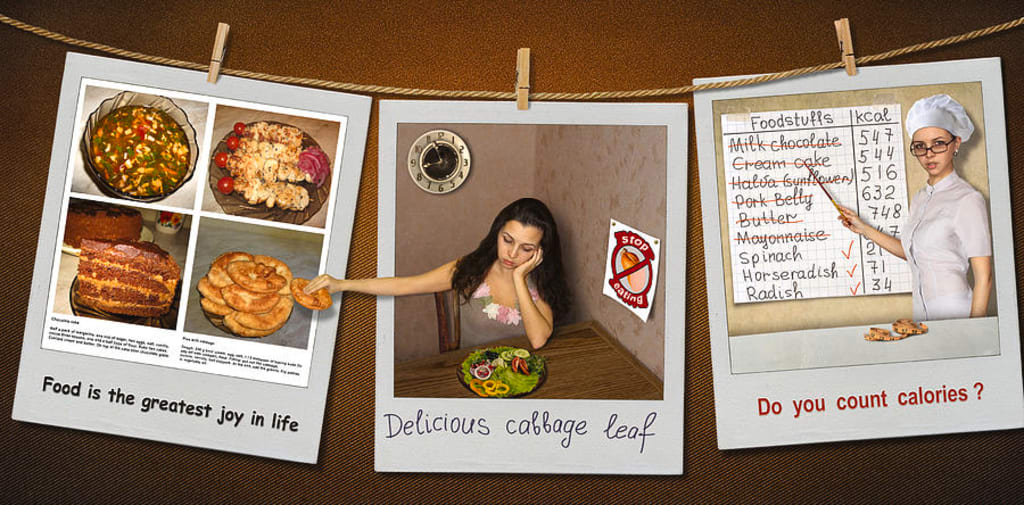Mastering Your Diet for Optimal Results
The Importance of Diet for Fat Loss

Introduction:
Losing fat requires a comprehensive approach that involves not only regular training but also careful attention to your diet. While many people are overwhelmed by the abundance of dieting options available, it's important to understand that all diets, regardless of their specific method, achieve fat loss through a caloric deficit. In this article, we will delve into the fundamentals of optimizing your diet for fat loss and explore the key factors to consider when designing an effective nutrition strategy. By understanding the role of calories, protein, carbs, and fats, you can create a diet that suits your preferences and supports your fat loss goals.
The Importance of Diet for Fat Loss
When it comes to fat loss, it's crucial to recognize that your diet plays the most significant role in determining your success. Even if your training is on point and consistent, without a proper nutrition strategy, you will struggle to achieve the desired results. The constant influx of new diets can make it challenging to choose the right approach. However, the truth is that all diets work in the same way: by creating a caloric deficit. The best diet for fat loss is the one you personally enjoy and can adhere to consistently. Regardless of the approach you choose, there are several key factors you need to get right to optimize your diet for fat loss.
Understanding Caloric Deficit
To maximize fat loss while minimizing muscle loss, you must pay close attention to your caloric intake. Research suggests that a moderate caloric deficit, allowing for a loss of around 0.7 percent of your body weight per week (approximately 1 pound per week for most individuals), is the most effective approach. Interestingly, a more aggressive calorie deficit can hinder fat loss rather than accelerate it. If you're unsure about your ideal calorie intake, a good starting point is to multiply your body weight by 13, as recommended in a 2014 paper by Eric Helms and colleagues. You can then adjust your calories based on your progress.
Finding Your Caloric Intake
Determining the right caloric intake for fat loss is essential. However, it's equally important to ensure you're consuming adequate amounts of protein, carbs, and fats. These macronutrients play distinct roles in supporting your fat loss goals. Let's explore the optimal intake for each.
The Role of Protein in Fat Loss
Protein is a crucial macronutrient for fat loss. It has a high thermic effect, meaning that it requires more energy to digest, absorb, and utilize compared to carbohydrates and fats. Additionally, protein helps preserve lean muscle mass during periods of calorie restriction, which is important for maintaining a higher metabolic rate and achieving a toned physique. Including an adequate amount of protein in your diet can also help control hunger and promote satiety, making it easier to adhere to your calorie deficit.
Recommended Protein Intake
The recommended protein intake for fat loss varies depending on individual factors such as body weight, activity level, and goals. A general guideline is to consume 0.8-1 gram of protein per pound of body weight per day. For example, if you weigh 150 pounds, your protein intake should be around 120-150 grams per day. Distributing your protein intake evenly throughout the day, including it in each meal and snack, can maximize its benefits for fat loss.
The Debate: Carbs vs. Fats
Carbohydrates and fats are the two primary sources of energy in the diet. Both play important roles in the body, but their impact on fat loss can vary depending on individual preferences and tolerances. The debate between low-carb and low-fat diets for fat loss is ongoing, and there isn't a one-size-fits-all answer. Some people find success with lower carbohydrate diets, while others prefer a higher carb approach. Ultimately, the key is to find a balance that works for you and allows you to sustain a caloric deficit.
Customizing Your Carb and Fat Intake
To optimize your diet for fat loss, it's important to customize your carbohydrate and fat intake based on your preferences and individual needs. Experiment with different ratios of carbs and fats to find what makes you feel the best, both physically and mentally. Some individuals may perform better and feel more satisfied with a higher carbohydrate intake, while others may prefer a higher fat intake. Remember that fat is a dense source of calories, so be mindful of portion sizes to stay within your caloric goals.
Optimal Diet Composition for Fat Loss
While individual preferences and needs can vary, a well-rounded diet composition for fat loss typically includes:
1. Adequate protein intake to support muscle preservation and control hunger.
2. A balance of carbohydrates and fats that suits your preferences and allows for sustainable adherence to a caloric deficit.
3. A focus on whole, nutrient-dense foods such as lean proteins, fruits, vegetables, whole grains, and healthy fats.
4. Sufficient hydration to support overall health and optimal body function.
A Typical Day of Eating for Fat Loss
To give you an idea of how a day of eating for fat loss may look like, here's an example:
Meal 1: Smoothie and Rice Cakes
• A protein-rich smoothie made with unsweetened almond milk, protein powder, spinach, and berries.
• Rice cakes topped with almond butter or avocado for a balance of carbohydrates and fats.
Meal 2: Post-Workout Meal
• Grilled chicken breast or tofu with a side of quinoa and roasted vegetables.
• A small amount of healthy fats like olive oil drizzled over the vegetables.
Snacks and Beverages
• Greek yogurt with a handful of nuts or seeds.
• Fresh fruits and vegetables for snacking.
• Water, unsweetened tea, or black coffee as preferred beverages.
Meal 3: Sushi
• Sushi rolls with lean protein options like salmon or tuna, accompanied by seaweed salad and cucumber slices.
• Opt for low-sodium soy sauce or tamari
Meal 4: Dinner
• Grilled lean protein such as chicken breast, turkey, or fish.
• A generous portion of steamed vegetables or a side salad with a light dressing.
• A small serving of complex carbohydrates like sweet potatoes or quinoa, if desired.
Snack/Dessert
• A small serving of Greek yogurt or cottage cheese with a sprinkle of cinnamon.
• A piece of dark chocolate or a small handful of nuts as a satisfying treat.
Remember, this is just an example, and you can customize your meals and snacks based on your preferences and dietary needs. The key is to focus on nutrient-dense whole foods, adequate protein, and a balance of carbohydrates and fats to support fat loss and overall health.
Physical Activity and Fat Loss
While nutrition plays a crucial role in fat loss, incorporating regular physical activity can significantly enhance your results. Exercise helps increase calorie expenditure, build lean muscle mass, and improve overall body composition. Aim for a combination of cardiovascular exercise, such as running or cycling, and strength training exercises to maximize fat loss and promote a toned physique. Consult with a fitness professional to design a workout plan that suits your goals and fitness level.
The Importance of Consistency and Sustainability
To achieve long-term fat loss, it's crucial to prioritize consistency and sustainability in your approach. Crash diets or extreme measures may yield short-term results but are often difficult to maintain and can lead to weight regain. Instead, focus on making gradual, sustainable changes to your eating habits and lifestyle that you can stick to in the long run. This includes finding a dietary pattern that suits your preferences, incorporating regular physical activity, and prioritizing self-care and mental well-being.
Seeking Professional Guidance
If you're struggling with fat loss or unsure about the best approach for your specific needs, consider consulting with a registered dietitian or nutritionist. These professionals can provide personalized guidance, help you set realistic goals, and design a customized nutrition and exercise plan tailored to your individual needs and preferences.
Remember, fat loss is a journey that requires patience, consistency, and a holistic approach. With the right mindset, a balanced diet, regular physical activity, and professional support if needed, you can achieve your fat loss goals and maintain a healthy lifestyle for the long term.
Staying Motivated and Overcoming Challenges
Maintaining motivation throughout your fat loss journey is crucial for long-term success. Here are some tips to help you stay on track and overcome common challenges:
1. Set realistic goals: Set achievable and specific goals that align with your overall vision. Break them down into smaller milestones to celebrate your progress along the way.
2. Find a support system: Surround yourself with supportive friends, family, or a community of individuals with similar goals. Having a support system can provide encouragement, accountability, and motivation when you need it most.
3. Track your progress: Keep track of your progress by using a journal, mobile app, or other tracking tools. Monitoring your food intake, exercise routines, and measurements can help you stay accountable and identify areas for improvement.
4. Celebrate non-scale victories: Remember that fat loss is not just about the number on the scale. Celebrate non-scale victories such as increased energy, improved sleep, increased strength, and improved mood.
5. Stay consistent: Consistency is key. Stick to your nutrition and exercise plan even on challenging days. Remember that small deviations from your plan won't derail your progress as long as you get back on track.
6. Manage stress: Stress can impact your fat loss efforts. Incorporate stress management techniques such as meditation, deep breathing exercises, or engaging in activities you enjoy to help reduce stress levels.
7. Get enough sleep: Aim for 7-9 hours of quality sleep each night. A lack of sleep can disrupt hunger and satiety hormones, leading to increased food cravings and hindered fat loss progress.
8. Stay hydrated: Drink an adequate amount of water throughout the day. Water helps regulate appetite, supports metabolism, and aids in digestion.
9. Practice mindful eating: Pay attention to your body's hunger and fullness cues. Eat slowly, savor each bite, and focus on nourishing your body with wholesome foods.
10. Be kind to yourself: Remember that fat loss is a journey, and setbacks may happen. Be patient and kind to yourself throughout the process. Focus on progress rather than perfection.
By incorporating these strategies into your fat loss journey, you'll be better equipped to overcome challenges and stay motivated for long-term success.
Conclusion
Fat loss is achievable with a balanced approach that includes a nutrient-dense diet, regular physical activity, and a sustainable lifestyle. It's important to prioritize your health, well-being, and long-term sustainability rather than seeking quick fixes. Consult with professionals when needed and remember to celebrate your achievements along the way. With dedication and consistency, you can achieve your fat loss goals and maintain a healthy lifestyle for years to come.
About the Creator
Waseem Mehmood
I am trying to covering the Topic of Weight Loss & Also Will try to Write on Health & Safety.
Enjoyed the story? Support the Creator.
Subscribe for free to receive all their stories in your feed. You could also pledge your support or give them a one-off tip, letting them know you appreciate their work.





Comments
There are no comments for this story
Be the first to respond and start the conversation.